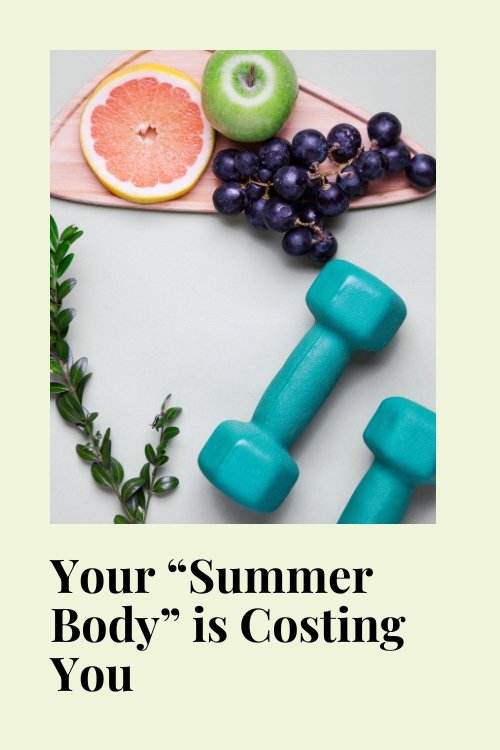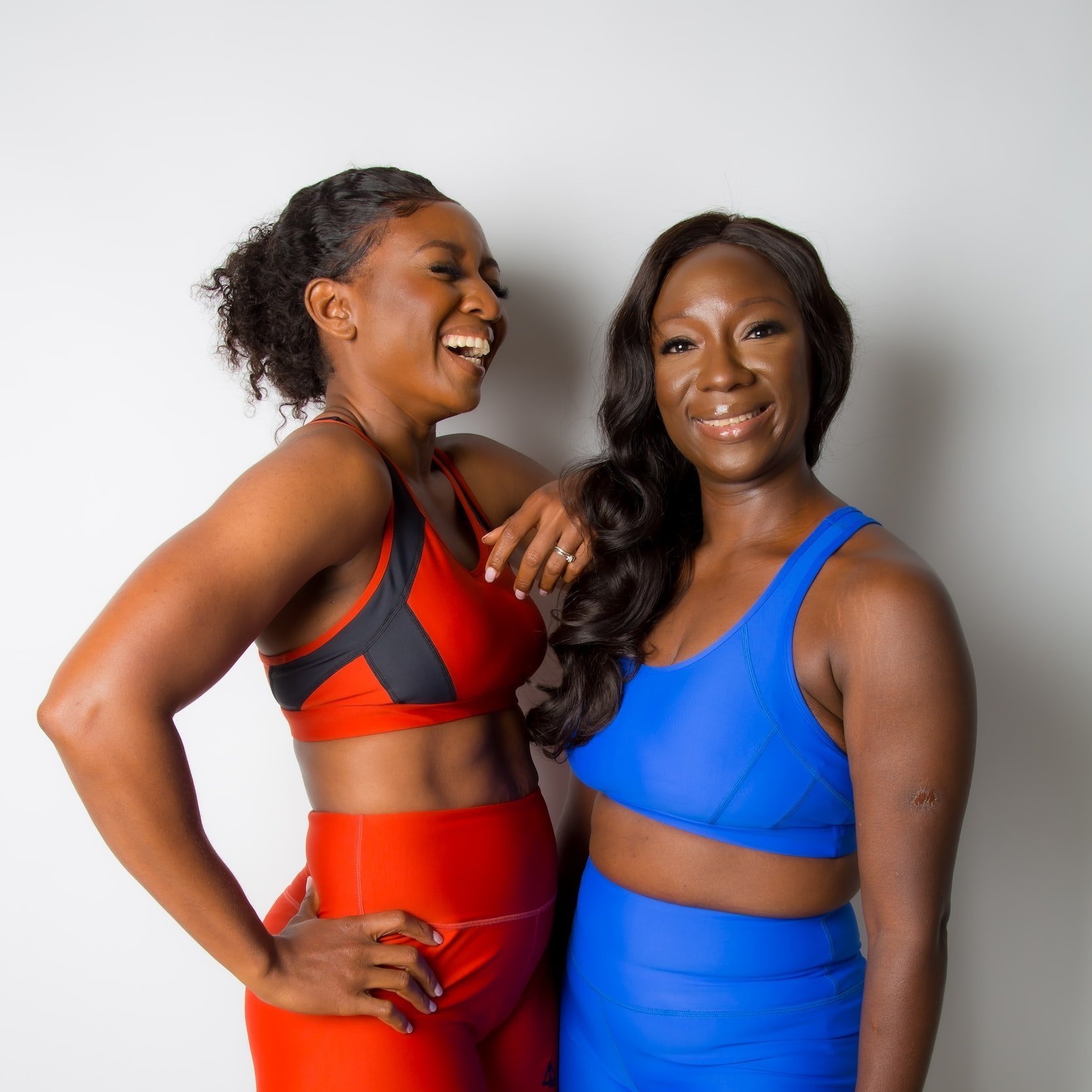Your “Summer Body” is Costing You
Nothing’s free in this world, and it’s time we get real about why we want to get “fit” for summer.
SHARE ON:
DISCLAIMER: Please consult a qualified healthcare professional before considering any new health or wellness regimen. Always seek the advice of your physician or other qualified health provider with any questions you may have regarding a medical condition or dietary issues. Never disregard professional medical advice or delay in seeking it because of information provided in this article. The content is for informational purposes only and should not be considered a substitute for professional medical advice, diagnosis, or treatment. Always consult with your healthcare provider to address any health concerns you may have. Before reading the following content, we also suggest reading our full disclaimer statement here.
TRIGGER WARNING(S): This article contains discussions of diet culture, body image issues, and harmful societal norms surrounding weight and appearance. Reader discretion is advised for those who may find these topics distressing or triggering. Please prioritize your mental well-being while engaging with this content.
Some of the links on this post might contain affiliate links. If you use any of these links to buy something we may earn a commission. For more information, please check out our disclosure statement. Thanks so much for supporting our free content!
@sonnyturner___ Dont waste your summer worrying about your body❤️#summer2020 #bodycontouring ♬ Pretty Girl Era - LU KALA
We saw this amazing TikTok from @sonnyturner___ (check out her content!) and got inspired to make this article about the pressures women face to get “summer body” ready.
--
Are you tired of being bombarded with 'summer body' content every spring? Join me in unraveling the damaging effects of this pervasive trend. In this article, we'll explore how societal pressures and diet culture manipulate us into chasing unattainable ideals, why we do it, and how we can get out of the toxic cycle.
In this Article
Not ready to read through just yet? No problem, save it on Pinterest!
"March madness is in full swing, and I'm not referring to basketball. Rather, it's the inundation of weight loss content steadily infiltrating my social media feeds. Just this morning, as I prepared my usual fried eggs on toast, I stumbled upon an Instagram Reel that epitomized the relentless push for the elusive 'summer body' (watch it here).
This reel, meticulously positioned between adorable Maltese puppies and an 'office siren' makeup tutorial, served as a stark reminder of the impending pressure to achieve the idealized physique. Despite it being barely mid-March, with temperatures nowhere near the summer highs, American women are already diving headfirst into their 'hot girl summer' preparations.
The age-old adage dictates that it's better to start early than late, prompting me to ponder this notion briefly. Before I knew it, my fried eggs had morphed into boiled, my toast replaced by quinoa, and my usual whole avocado halved. While my modified meal may appear more nutritious on the surface, with boiled eggs boasting 20% less fat than their fried counterparts, and quinoa trumping white sourdough in nutritional value, the motivations behind this dietary shift are more complex than mere health consciousness.
While technically healthier, my revised meal choice was underpinned by a mindset oscillating between a genuine desire for well-being and an unconscious fixation on maintaining a slender figure. Thus, the true healthfulness of my decision remains somewhat ambiguous, revealing the intricate interplay between notions of health and thinness.
Grappling with the “Summer Body” and Thin Ideal Propaganda Machine
I often find myself grappling with the motivations behind my dietary and fitness choices: are they driven by a genuine desire for long-term health or a fear of being labeled as overweight? Recognizing the importance of maintaining good nutrition and fitness levels, particularly as an African American woman, is crucial.
Heart disease ranks as the leading cause of death among Black women in the United States, as reported by the American Heart Association. Many women in my community have faced a myriad of health challenges as they've aged, many of which could have been mitigated through healthier eating habits and regular exercise routines.
However, it's essential to contextualize these choices within a broader cultural landscape. As a late Millennial born in 1996, I grew up consuming media such as America's Next Top Model, Mean Girls, and Bring It On, all of which targeted young women. While I am grateful for the mainstream representation of women's interests during that time, I cannot overlook the problematic portrayal and treatment of women's bodies within these productions.
Wondering why you’re seeing ads? Check out our Disclosure Policy.
The media often placed excessive emphasis on thinness, accompanied by a casual acceptance of eating disorders, a dynamic less tolerated in today’s cultural landscape. I distinctly remember watching A Cinderella Story as a child, excited to see a Black girl represented in the main cast. However, my enthusiasm quickly waned when the character fell victim to ridicule in one of the first scenes. She was mocked by one of the characters, who joked about her alleged consumption of laxatives as if they were a staple in her diet.
Confused by the scene's humor, I turned to my mother for clarification. Unaware of my growing awareness of diet culture, my mother simply explained laxatives as "something to help you poop”. As I was a curious child prone to asking random questions, my mom refrained from probing further for the sake of her sanity. Thus, I was never informed that using laxatives for weight loss could be dangerous.
Thinness and Body Shaming in the Media
I know I’m not alone in this experience. Such programming was commonplace, whether you were consuming or creating it. I willingly absorbed the normalization of fat-shaming in shows like the aforementioned America’s Next Top Model (ANTM), where contestants like Robin Manning were subjected to undue scrutiny.
Despite being an American size 6 during filming, well below the average size 14 to 18, as per data from researchers at Washington State University’s Department of Apparel Merchandising, Design, and Textiles, Robin, and her peers, were expected to maintain or lose weight without adequate support from judges or production staff.
Feminist media critic Jennifer Pozner has extensively explored this phenomenon, shedding light on the detrimental portrayal of women's bodies in early 2000s reality TV shows like ANTM, as documented in her book Reality Bites Back. She highlights the ways in which these shows perpetuate harmful stereotypes and reinforce unrealistic beauty standards for women, such as pressures to be extremely thin at any cost (i.e., “heroine chic”), White, able-bodied, etc.
“
Today, despite the rise of social media movements promoting body positivity and acceptance, content still plagues my feed, fixated on achieving the aesthetics of the coveted thin ideal a lot more than that promoting holistic, sustainable approaches to health.
Moreover, Pozner examines how reality TV exploits and objectifies female contestants in order to reinforce this ideal, often subjecting them to intense scrutiny and criticism based on their appearance alone. A truly disheartening aspect of this reality is that most of these women remain forgotten and have fallen back into obscurity after their short stints on reality TV, with very little to show for their public humiliation and exploitation.
Pozner’s work in combination with this fact highlights, in my opinion, the enticing nature of the thin ideal. Much of this early 2000s content came at a time when popular culture messaging was fervid on the notion of the 21st century being a post-feminist world, with all women being the most free and safe they’ve ever been.
Putting aside the Eurocentric-classism and pure ignorance of global politics that those who pushed such notions would have had to adopt, the early 2000s zeitgeist was undeniably the “misogynistic wasteland” that Adam Saraswati Rawlings famously called it out to be.
Wondering why you’re seeing ads? Check out our Disclosure Policy.
Today, despite the rise of social media movements promoting body positivity and acceptance, content still plagues my feed, fixated on achieving the aesthetics of the coveted thin ideal a lot more than that promoting holistic, sustainable approaches to health. I believe similarly to commentary YouTuber Jordan Theresa, that the toxic remnants of the early 2000s media landscape hasn’t gone anywhere and won’t be anytime soon.
Or, at the very least, as argued by media theorist Kimbery Nicole Foster in her appraisal of the rise of the Barbiecore aesthetic, that our culture seems hell-bent on reverting backward through an embrace of those same “traditional White-femininity” aesthetics we’ve recognized were harmful 20 years ago.
Your “Summer Body” isn’t What You Think it is
It makes sense that we’re still collectively struggling to cultivate healthier mindsets around our bodies and health. The summer body ideal remains one of the most compelling capitalist imaginaries. And I mean that—imaginary. The phrase “summer body” finds its roots in the term “bikini body”, which was popularized in a 1961 ad campaign by a chain of weight loss salons called Slenderella International.
The company gained notoriety for its fraudulent practices, making unsubstantiated claims that women could shed pounds simply by reclining on vibrating tables. Despite the company's eventual downfall due to investigations by the IRS, other weight-loss and female-focused brands seized the opportunity to market their own versions of the ideal bikini/summer body through ads.
Since childhood, I recall being inundated with content emphasizing the necessity of achieving a summer-ready physique. Commercials for Slim Fast, Jenny Craig, and Weight Watchers always seemed to surface as the sun shone brighter and the temperatures rose. If you hadn't met your New Year’s Resolution fitness goals, no worries—just redirect your focus to your summer body.
All it takes is a subscription to Jenny Craig, costing anywhere from $420 to $856 per month, and you'll supposedly be bikini-ready in no time. Or perhaps not. Fad diets, often promoted as solutions for attaining a summer body, rarely deliver the desired long-term results. In fact, many of these popular diets lack scientific evidence to support their efficacy.
A 2020 review of diets published in the Journal of Nutrition revealed that the long-term outcomes of most diets—ranging from vegetarianism to keto—pursued primarily for weight loss, show little variation in their effectiveness. Consequently, these "small differences do not instill confidence for prescribing one diet over another" when it comes to achieving sustained weight loss.
Wondering why you’re seeing ads? Check out our Disclosure Policy.
Your Summer Body is Costing You: Sustainable Weight-Loss
In reality, there is likely no one-size-fits-all diet that can universally facilitate weight loss. Instead, the emphasis should be on factors like dietary quality (such as consuming nutrient-rich foods), energy expenditure through regular exercise, and mental health interventions like therapy to maintain a healthy weight. Despite this, we are constantly inundated with advertisements and promotions for wellness trends promising to be the ultimate solution for shedding pounds and keeping them off.
One notable example is registered dietitian, content creator, and recovered eating disorder advocate Abby Sharpe, who extensively analyzed the Weight Watchers phenomenon. She highlighted how the brand continues to extract money from its customers, despite the fact that most individuals following its programs fail to achieve long-term success.
Even after rebranding as WW, the company persists in marketing its programs, disregarding numerous studies demonstrating that weight lost through such diets is typically regained within 2-5 years. This phenomenon has led feminist social critic Susie Orbach to argue that the diet industry has a vested interest in perpetuating cycles of weight loss and dieting.
Follow us on:
By keeping individuals reliant on their products indefinitely, they ensure a steady stream of revenue. This unsustainable business model becomes evident when consumers no longer require their services.
Furthermore, it is essential to recognize the corporate ownership behind these weight-loss programs. Weight Watchers is one example, having been owned by Heinz in 1978 and subsequently sold to Artal Investment Company, a significant player in the pharmaceutical industry, in 1999.
Also, Slim Fast is under the umbrella of Unilever, the same conglomerate that owns indulgent treats like Ben and Jerry's and Magnum ice cream. Jenny Craig, another well-known weight-loss brand, is owned by Nestlé, which also markets beloved confections like KitKat and Nesquik.
These major food corporations not only face a conflict of interest by simultaneously offering weight-loss programs and producing the foods that necessitate such programs but have also been involved in lobbying against measures aimed at encouraging healthier dietary choices.
Wondering why you’re seeing ads? Check out our Disclosure Policy.
For instance, according to a report by the NGO Public Eye, Nestlé exerted pressure on Mexican authorities to alter legislation that labels certain foods, including those under the Nestlé umbrella, as unhealthy for consumers. These labels aim to inform consumers about nutritionally concerning foods, such as those high in calories, processed sugars, and saturated fats.
The significance of this lobbying becomes apparent when considering Mexico's alarming rates of childhood obesity, with 39% of children aged 5-11 being overweight. Nestlé's attempt to influence legislation targeting unhealthy foods amid an obesity epidemic raises ethical concerns, especially given its dual role as both a seller of unhealthy products and weight-loss programs to consumers affected by them.
As consumers, it's crucial to remain vigilant about the motives behind the products and programs we're encouraged to embrace. The intertwining of profit-driven agendas with purported health solutions underscores the need for critical scrutiny of corporate interests and societal pressures.
Your Summer Body is Costing You: A Healthy Relationship With Exercise
Undeniably, there is significant profit potential for corporations in the diet industry, particularly amidst the escalating obesity rates throughout the United States. The summer body trend, fueled by these aforementioned companies, media outlets, and everyday individuals, underscores this reality. Everyone seems eager to capitalize on the weight gain crisis, including fitness-focused brands.
Companies like WW and Jenny Craig share a common trait in their program models: a predominant emphasis on correcting food intake with minimal focus on fitness. This approach contradicts research demonstrating that regular exercise is among the most crucial ways to maintain a healthy weight and overall lifestyle.
Extensive research reveals the multitude of benefits offered by regular exercise, including extended lifespans, enhanced self-esteem, reduced risk of chronic diseases, improved sleep quality, and effective weight management. However, many women subscribing to the summer body trend fail to experience these lifelong benefits due to the hyperfocus on overly intense workout schedules that even seasoned fitness enthusiasts would struggle to maintain.
Conducting a brief search on Pinterest, Instagram, and TikTok for summer body fitness content, I found that most of these programs—some merely hastily assembled regimens devoid of evidence-based principles or input from qualified fitness or health professionals—center around short-term weight loss strategies lasting no more than 3-6 weeks.
While short-term exercise plans may yield results within the specified time frame, they are unlikely to provide sustainable outcomes. As we've previously discussed in our article on choosing conscious nutrition and wellness, building new habits is a gradual process debunking the myth of quick, lasting changes.
Research indicates that forming new habits requires approximately 66 days of consistent practice, far longer than the 3-6 week fitness programs often promoted on social media platforms.
This means, in essence, there are no shortcuts to weight loss through fitness. Prioritizing "summer body" readiness over establishing enduring changes in your relationship with fitness will only perpetuate the cycle of fad fitness indefinitely, at the expense of both mental and physical health.
Wondering why you’re seeing ads? Check out our Disclosure Policy.
Your Summer Body is Costing You: Your Mental Health, Self-Image, and Emotional Well-Being
In the quest for the elusive "summer body," it's critical to acknowledge the glaring omission in many fitness and diet programs: the neglect of mental health and well-being. There is a clear assumption in “summer body” content and media that getting thinner for summer will always have a net positive effect on one's mental health.
However, data suggests this is too simple of a perspective and may not necessarily be true. A wealth of evidence demonstrates there is a profound impact of psychological factors on dietary habits, exercise adherence, and overall wellness. Meaning, mental health issues can often be the cause of ineffective weight-management, of which focusing on weight-loss alone will not be an effective strategy.
There’s also the fact that weight-loss behaviors such as dieting, calorie restriction and excessive exercise can all lead to increased feelings of anxiety, stress and negative self-image. Even more so when, as mentioned before, most women regain weight lost from such behaviors within a few years.
These feelings can then contribute to developing disordered eating behaviors and patterns, which create chronic health conditions (i.e., cardiovascular disease, endocrine system disturbances, etc.) that are sure to make weight-management a worse problem than before. Very few weight-loss programs address this reality adequately or are responsible in their marketing to let potential consumers know that these programs pose such risk.
Most Read from Health & Wellness
Women are disproportionately targeted by the "summer body" narrative, a trend that exploits societal pressures and insecurities to drive consumption within the diet industry. The relentless marketing of products and programs preys on women's concerns about their self-image, effectively commodifying their mental health.
This exploitation perpetuates a harmful cycle wherein women's self-worth becomes intertwined with their physical appearance, leading to feelings of inadequacy and perpetuating unrealistic beauty standards.
Moreover, the "summer body" ideal reduces women to fragmented body parts, such as "toned tummies" or "lifted butts," disregarding their holistic identities. This reductionist approach encourages women to internalize societal beauty norms, often at the expense of their mental well-being.
“
It is imperative to recognize the interconnectedness of mental and physical health and prioritize holistic well-being in our approach to fitness and nutrition.
By reinforcing the notion that physical attributes determine worth, this narrative marginalizes women and perpetuates harmful body ideals, contributing to low self-esteem and negative body image. In response to these challenges, healthcare professionals advocate for a comprehensive approach to women's health that integrates mental interventions, such as cognitive-behavioral therapy (CBT), into nutrition and fitness regimens.
Recognizing the pivotal role of mental health in shaping lifestyle behaviors, these experts emphasize the importance of addressing underlying psychological factors to combat rising obesity rates. By prioritizing mental wellness alongside physical fitness, individuals can cultivate a healthier relationship with their bodies and foster sustainable lifestyle changes.
It is imperative to recognize the interconnectedness of mental and physical health and prioritize holistic well-being in our approach to fitness and nutrition.This paradigm shift requires a concerted effort from healthcare providers, policymakers, and society as a whole to dismantle harmful beauty ideals and, instead, promote inclusivity, diversity, and self-love.
Trading the Summer Body for Holistic Health: Diets vs Diet Culture
In the cacophony of voices advocating for diets and denouncing diet culture, it's crucial to distinguish between the two. While diet culture often garners criticism for perpetuating harmful beauty standards and promoting unrealistic ideals, diets themselves should not be automatically vilified.
Australian public health experts Natalie Jovanovski and Tess Jaeger define diet culture as "a moral hierarchy of bodies fueled by health myths," highlighting its damaging influence on individuals' self-esteem and body image. It's normal to despise diet culture's toxic messaging while acknowledging that diets and individuals who choose dietary restrictions can serve diverse purposes beyond mere aesthetic pursuits.
Indeed, diets and weight loss efforts can be reframed as acts of self-care and societal contribution. For instance, the promotion of vegan and vegetarian diets is often rooted in ethical and environmental concerns rather than solely focused on achieving a slimmer physique.
Wondering why you’re seeing ads? Check out our Disclosure Policy.
Choosing to prioritize plant-based eating reflects a desire to foster a healthier planet and reduce one's ecological footprint, underscoring the broader societal implications of dietary choices. Moreover, diets adopted for spiritual reasons, such as fasting during Ramadan or adhering to Hindu and Buddhist dietary guidelines, emphasize a deeper connection to one's beliefs and cultural practices, fostering positive relationships with food and promoting holistic well-being.
For individuals seeking to adopt new diets to improve their health, it's essential to recognize the influence of upbringing and learned eating habits. Many people inherit dietary patterns from their families, which may not always align with optimal health practices.
Growing up in environments where food choices are restricted or unhealthy can perpetuate detrimental eating habits, underscoring the importance of empowering individuals to break free from these cycles through dietary interventions. Initiating dietary changes to correct ingrained habits and cultivate healthier lifestyles can be transformative and empowering, offering individuals agency over their well-being and fostering positive relationships with food.
Instead of fixating on attaining a "summer body," it's more productive to introspect on one's body image concerns and identify areas for personal growth in fitness and nutrition.
Mindful Reflection: Take time to reflect on your thoughts and feelings about your body. Consider journaling or engaging in mindfulness practices to explore the origins of negative body image beliefs and identify triggers for self-criticism.
Self-Compassion Exercises: Practice self-compassion by treating yourself with kindness and understanding. Challenge negative self-talk and replace it with affirming statements that promote self-acceptance and appreciation for your body's strengths and abilities.
Body Positive Media Consumption: Evaluate the media you consume and its impact on your body image. Seek out body-positive content that celebrates diverse shapes, sizes, and abilities, and unfollow or limit exposure to accounts that promote unrealistic beauty standards.
Physical Activity for Joy: Shift your focus from exercise solely for appearance to activities that bring you joy and enhance your overall well-being. Explore different forms of movement, such as dancing, hiking, or yoga, and prioritize activities that make you feel energized and fulfilled.
Nutrition as Nourishment: Approach nutrition as a means of nourishing your body rather than restricting or depriving yourself. Focus on incorporating whole, nutrient-dense foods into your diet while allowing flexibility for occasional treats and indulgences without guilt or shame.
Seeking Professional Support: Consider seeking support from a therapist, nutritionist, or certified fitness trainer who can provide personalized guidance and strategies for improving body image and adopting sustainable health habits. Therapy modalities like Cognitive-Behavioral Therapy (CBT) and Acceptance and Commitment Therapy (ACT) can be particularly beneficial for addressing body image concerns and promoting self-acceptance.
By prioritizing activities and rituals that promote self-love and acceptance, individuals can cultivate a healthier relationship with themselves and their bodies, transcending the superficial pressures perpetuated by diet culture. Ultimately, reclaiming diets as tools for self-improvement and societal betterment empowers individuals to embrace holistic health practices and reject harmful beauty standards, fostering a culture of inclusivity, self-love, and well-being.
Written by:
Teyah Nichole
Nichole is an American (she/her), animal-loving, coffee-obsessed, small-talk hating, ENFJ-T , vegetarian based in London. She founded W&S almost two years ago before starting her PhD, with a desire to learn in community with like-minded women. [Get in touch]
Wondering why you’re seeing ads? Check out our Disclosure Policy.

















As we approach conscious living, we often tend to forget this critical part of our health.